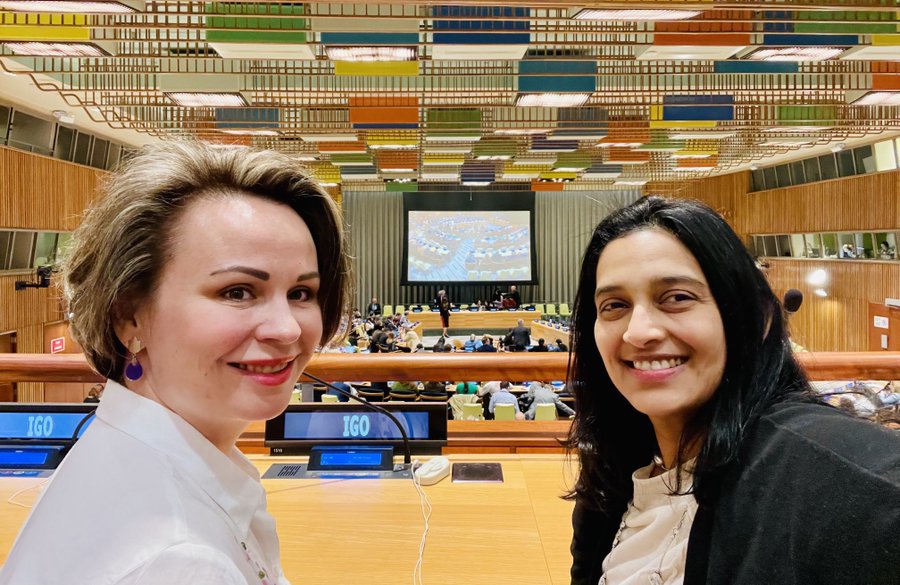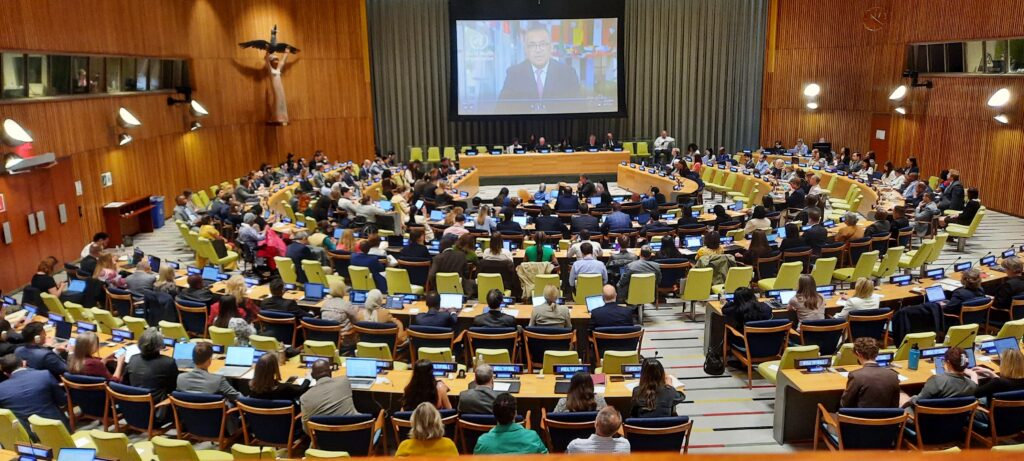Post
Published on August 3, 2023
Despite commendable advances in new Tuberculosis (TB) diagnostics and more safe and effective TB treatments, as depicted in the latest Global TB Report, 10.6 million people fell ill, and 1.6 million people died of TB in 2021. 2023 is a critical year with opportunities to raise visibility, political commitment, funding, and investments for the more effective and people-centered TB response.
On 8-9 May 2023, UN Multi-stakeholder Hearings on three components – TB, Universal Health Coverage (UHC) and Pandemic Prevention, Preparedness and Response (PPPR) – were held at the United Nations (UN) Headquarters in New York. They brought together representatives of the UN Member States, observers of the General Assembly, UN Missions, technical and donor agencies, civil society organizations and TB-affected community, academia, professional associations, and the private sector to voice up their expectations on the priorities of the Political Declaration ahead of High-Level Meeting on TB (UNHLM on TB) in September 2023 which will take place during the UN General Assembly.
Dr. Amrita Daftary, Dahdaleh Faculty Fellow and Associate Professor at the School of Global Health, York University, and a founding director of the Social Science & Health Innovation for TB (SSHIFTB), and Yuliya Chorna, doctoral student of the Program in Social Anthropology, York University and Dahdaleh Global Health Graduate Scholar, with the support from the Dahdaleh Institute, attended the Multi-stakeholder Hearings. Their participation in the Multi-stakeholder Hearings and side events helped to expand research and networking opportunities with the global academia, affected community, and other stakeholders in TB and analyzing existing discourses central for TB response.


Dr. Daftary’s intervention during the TB Multi-stakeholder Hearings gave a strong impulse to further negotiations of the text of the Political Declaration on the value of the social science TB research: “The TB research & development agenda has to include social science research adjacent to biomedical research. Social science TB research is the approach to unveil and address the social determinants of TB. Often qualitative, it is by nature inclusive, participatory, equity-oriented, anti-colonial and community engaged. It can serve as a bridge to mobilize the acceptability and utilization of TB innovations and technologies.”
Social scientists have indeed made a tremendous contribution to the growing recognition of TB as a disease linked to social determinants and inequities. Despite this recognition and some momentum towards multisectoral actions in the TB response, TB policy and practice still retains a predominantly biomedical focus.
Hopefully, the 2023 UN HLM on TB (offers a window of opportunity to transform normative discourses in TB and stimulate steady changes in subsequent responses, including sufficient funding allocations to support social science insights on the drivers of TB, and to inform the development and evaluation of emerging tools and approaches. The programme is available at the UN General Assembly Resolution: A/RES/77/274. Specially accredited stakeholders may register here and ECOSOC-accredited organizations may register here by August 11, 2023, 12:00 EDT.
A zero draft of the Political Declaration of the UNHLM on TB has been released after these UN Multi-stakeholder Hearings, and there have been further consultations facilitated by various coordination platforms with engagement of stakeholders, including academia to feed into the document - ensuring it prioritizes a more equitable and people-centered TB response.
Themes | Global Health & Humanitarianism |
Status | Active |
Related Work | |
Updates |
N/A
|
People |
Amrita Daftary, Faculty Fellow, Faculty of Health - Active
Yuliya Chorna, Dahdaleh Global Health Graduate Scholar, Faculty of Liberal Arts & Professional Studies - Active |
You may also be interested in...
Update — Modelling Health Impacts of Climate Change in Malawi Through the Context of Cyclone Freddy
Malawi was ravaged by the month-long Cyclone Freddy, which caused widespread devastation and death. The Lake Chilwa basin settlements in south-eastern Malawi remain flooded following severe rains, posing higher risks from infectious diseases such as ...Read more about this Post
Dahdaleh Institute Sponsors World Non-Communicable Disease Congress 2023
The Dahdaleh Institute for Global Health Research is a proud sponsor of the third World Non-Communicable Diseases Congress (WNCD 2023), taking place from June 25 to June 30, 2023, at the Metro Toronto Convention Centre ...Read more about this Post
York University welcomes latest York Research Chair appointees
Eight researchers across York University will join the York Research Chairs (YRC) program – the University’s internal counterpart to the national Canada Research Chairs (CRC) program which recognizes outstanding researchers. These YRCs belong to the ...Read more about this Post
